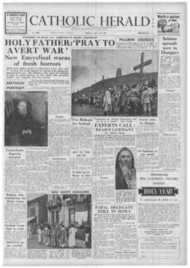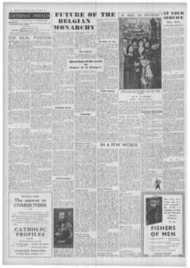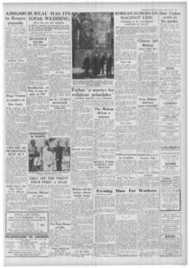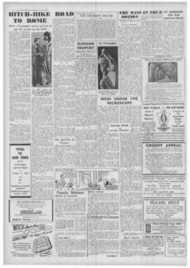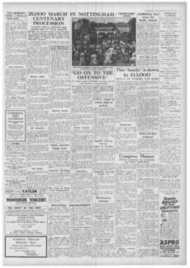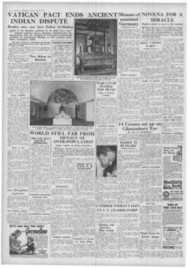Page 4, 28th July 1950
Page 4

Report an error
Noticed an error on this page?If you've noticed an error in this article please click here to report it.
Tags
Share
Related articles
In This Extract From A New Book On English Catholic
Slisis, And He Had Again To Choose Between Two Roads:
In A Few Words By Jotter
Things New And Old
IN A FEW WORDS
Reflections on Belloc MUSING about Hilaire Helloes ' eightieth birthday, 1 was thinking how very different has been the Catholic approach of the handful of Catholic English writers whose names have really become public property in recent times. It is constantly said that because Catholics share the same Faith, they are all of a piece. But. as has been remarked. even in the case of Jesuits where faith and training would lead one to expect one mould, the differences between different members of the Society are especially striking. Actually, it is among secularists and non-believers who pride themselves on utter freedom to be themselves that one gets " stereotypes," as one notices by looking around, titter freedom of thought makes for superficiality and unconscious submission to the trends of the times, whereas a man with a real faith and disciplined by his training is likely to develop his own personality and character, thus, within the common outlook, strongly accentuating his own particular and unique variety among the infinite number of diversities in God's infinitely rich creation. Heaven, despite the one all-embracing Beatific Vision, will probably turn out to be the true palace of varieties.
Catholic Writers 41"(HINK1NG of Belloc, I think nat urally urally of Chesterton, and also of Gill, of Waugh, of Knox, of Graham Greene, of Bruce Marshall, as men who writing or working fully as Catholics and because Catholics, have become public names-and yet each was Catholic in his own way, stressing one of many Catholic approaches. Belloc was the straightforward fighter, ramming Catholicism down people's throats whether they liked it or not, and causing people to like it because of his rugged honesty, wit and masterly technique. Chesterton, like a ballet dancer, demonstrated that the most unexpected poses are in fact the most natural and beautiful, and the Church in being the greatest paradox of all must inevitably be the one truly sane thing in a dissipated world, Gill was the contemplative in art. tracing the lineaments of God's creative work by some direct touch with the Divine Reality. Greene, despairing of the complacency of a self-adoring world, finds God most clearly revealed in the mercy of God held out to the self-acknowledged sinner. And so on. An interesting essay could be written on the subject.
Catholics and the Pictorial Weeklies REVERTING, accidentally as it were, to our recent discussion on modesty and the contemporary Press, 1 should say that those who take the strictest view will probably be missing some very well illustrated and effective Catholic features in the country's two best known weekly pictorials, Both, it seems to me. have really tried to play fair with Holy Year features, occasional picturesque Catholic events and ceremonies, and the like. In these cases the accompanying article or picture captions are either written by Catholics or vetted by Catholics. It is perhaps unfortunate that on the cover some reference to a Holy Year feature should appear prominently cheek by jowl with an actress or belle caparisoned in a very un-Holy Year manner, but there it is, and I think we should take an indulgent view of it, remembering that in these pictorials we have a good example of fairness towards things Catholic which is often wanting in their more high-brow contemporaries.
In America THIS sort of odd juxtaposition is actually a good deal commoner in America. There immodesty in high-class papers seems to me at any rate to be a good deal bolder than in similar papers over here, and yet the same papers, catering for an immense number of Catholic readers, allow plenty of space for excellently got-up Catholic features. All this is an odd feature of Catholic life in America about which i have heard little, and I sometimes wonder what view is there taken of a very freeand-easy approach to this question among a public in which Catholics form so large a minority.
Windsor Memories
RECENTLY, I have been looking
RECENTLY. the American Life in order to read the excellently written and fascinating Memoirs of the Duke of Windsor. What memories they recall, but I confess I was not prepared for such good judgment. so sane and balanced an outlook, such restraint---yet not without a touch of asperity towards those who wished him ill, all the more effective because so delicately expressed. I liked particularly the remark : " Perhaps the rendering of these simple courtesies falls more easily upon Kings than upon politicians; after all we do not have to run for office," From the Catholic point of view, it is always well to remember that, judged from one side. it is good Catholic doctrine (as against Wycliff) that a man's personal and private life does not invalidate the duly conferred public office which he holds, and, judged from the other. in matters matrimonial, it is very often doubtful whether the marriages of people who have been divorced were ever true marriages. In any case. they usually demand close and expert investigation before the matter is certain.
Assy Pictures IN the same Life which ends the series of the Duke's Memoirs, there are some first-rate coloured pictures of paintings in the now famous church in Assy, where Father Couturier, 0.P., himself a painter once with a studio in Paris, wants church art to " speak to modern man." I have been trying for a long time to get some really good pictures so that Catholics in this country can get a fair idea of the experiment—so far without success. The pictures in Life which are coloured and therefore not easily used are not wholly satisfactory.
Churchill's Chivalry reNE despairs of any sort of review ONE The Grand Alliance, Mr. Churchill's third volume (Cassell, 25s.), so full and monumental is it. But one thing struck me: the essential civilisation of the great man. For strictly war purposes, he could let flow. the full torrent of his unequalled invective, but at heart he stands conspicuously apart from the meaner men who Lose sight of humanity and the graces when they think and behave politically. Consider this judgment on Hess : " Reflecting upon the whole of this story, I am glad not to be responsible for the way in which Hess has been and is being treated. Whatever may be the moral guilt of a German who stood near to Hitler, Hess had, in my view, atoned for this by his completely devoted and frantic deed of lunatic benevolence. He came to us of his own free will, and though without authority, had something of the quality of an envoy. He was a medical and not a criminal case, and should be so regarded." Of Rommel Churchill writes " In the sombre wars of modern democracy chivalry finds no place. Dull butcheries on a gigantic scale and mass effects overwhelm all de tached sentiment. Still, I do not regret or retract the tribute i paid to Rommel, unfashionable though it was judged."
Stalin the Great TIIE volume seems to make it amply clear that Stalin personally look thoroughly seriously the Communist-Nazi entente at the beginning of the war, and indeed went out of his way to underline the intimacy of the union. So much so that neither Stalin nor Molotov would pay any heed to the ample signs of Hitler's anti-Russian aggression. "Stalin must have tried very hard to preserve his illusions about Hitler's policy," Churchill sums up, and " final fatuity" is the description he applies to Molotov's behaviour. While one still wonders how the Communists can get away with that "Fascist" record, it is some consolation to think today that the same men, guilty of so astonishing an ideological and political blunder, are wondering what is happening in the world. If only they do not blunder into wart Hitler on Franco THE hook contains one of the soundest of war forecasts, but this time it comes from Hitler who
wrote to Mussolini "I fear that Franco may be about to make the biggest mistake of his life. I think his idea of receiving from the democracies raw materials and wheat as a sort of recompense fur his abstention from the conflict is extremely naive. The democracies will keep him in suspense until he has consumed the last grain of wheat, and then they will unloose the fight against him." In terms of diplomatic war, at least, this has proved quite true.
St. Jude's Corner THOUGH money-lending, as well as house-searching, are really banned from our St Jude's Corner, I think I have very good guarantees
blog comments powered by Disqus


